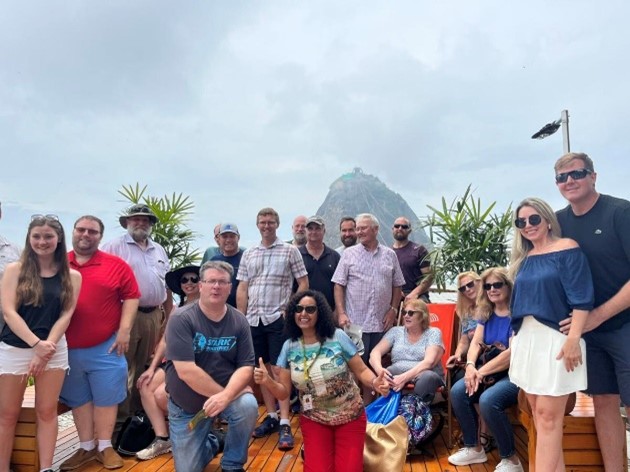 DeLoss Jahnke, senior audio specialist for RFD Radion Network in Illinois, visited Brazil in January 2024 to learn about agricultural practices.
DeLoss Jahnke, senior audio specialist for RFD Radion Network in Illinois, visited Brazil in January 2024 to learn about agricultural practices.
Commstock Investments organizes the annual Brazil Farmland Tour. Matthew Kruse, president of Commstock Investments, met his wife, Caroline, in Brazil while managing 22,000 acres of row crops for private investors. Caroline is originally from Brazil, and her family farms a diversified operation of 11,000 acres of soybeans, corn, and coffee.
Jahnke was invited to attend this year, and the first stop was Caroline’s family farm in Minas Gerais.
“We got to see how an authentic Brazilian farm operated and what its coffee processing looked like,” Jahnke said. “After that, we flew to Mato Grosso, Brazil’s largest agricultural state. We toured several operations, including sugar cane, corn, and an ethanol plant.”
The trip rounded out on the beaches of Rio de Janeiro before the group flew back to the United States. Jahnke said his biggest takeaways revolved around how different Brazilian agricultural practices are from those in America.
“It doesn’t freeze down there, so they can plant two crops and grow something year-round,” Jahnke said. “We drove by one field, and I saw two tractors running a planter while seven combines were harvesting in the field next door.”
Jahnke noted there are other distinctions between Brazilian and American agriculture.
“They don’t have to pay their labor nearly as much because the cost of living is so much less,” Jahnke said. “Currency is worth less, so they can operate much differently than we can.”
He also said transportation poses unique challenges for farmers in Brazil.
“They’ve made huge investments in their ports, but the internal infrastructure is still lacking,” Jahnke said. “They don’t have the roads or railroads that we do.”
While there were noticeable differences, Jahnke found common ground with the producers he met.
“We had language barriers, but those of us on the tour appreciated the people in Brazil and what they do for a living because we can relate,” Jahnke said. “We interacted with them, and I think they also appreciated us. It was really enjoyable to see agriculture in a completely different setting.”
